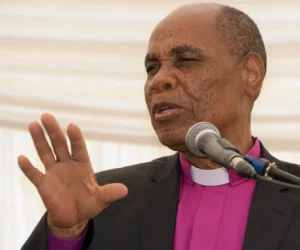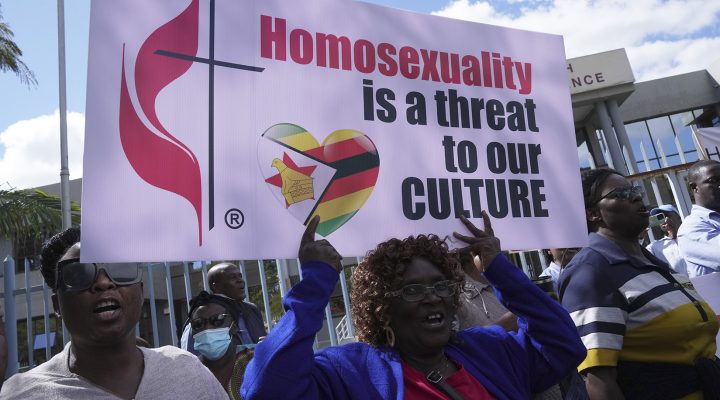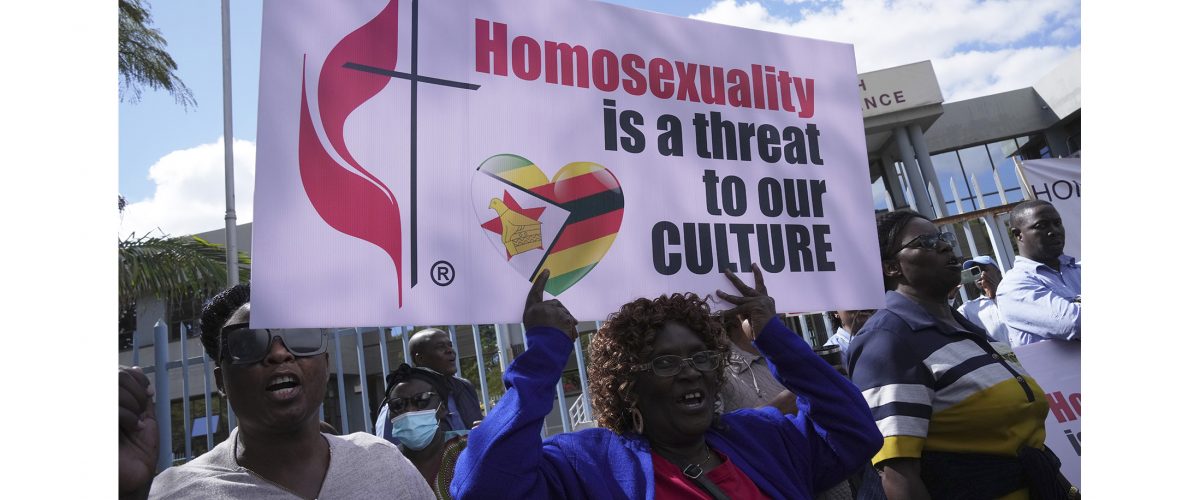New details have recast the apparent immigration detention of United Methodist Bishop Eben K. Nhiwatiwa in Nigeria as a security measure to protect the cleric rather than arrest him over a visa conflict.
Initial reports from Nigeria claimed the bishop had been either “arrested” or “detained” on a complaint about his visa status, apparently lodged by a breakaway faction led by former Bishop John Wesley Yohanna.
In an interview with Zimbabwean media Aug. 27, Nhiwatiwa said his apparent detention by Nigerian Immigration Service officials Aug. 23-26 actually was an attempt to protect him from “an agitated factional group within the church.”
According to The Herald-Zimbabwe, Nhiwatiwa said immigration officials contacted him while he was in Yola, Adamawa State, as he attempted to arrange for the December election of a new bishop to succeed former Bishop Yohanna, who resigned in July to join the breakaway conservative Global Methodist Church that condemns homosexuality.
NIS had received a pamphlet, apparently circulated throughout Nigeria, alleging Nhiwatiwa was in the country to promote homosexuality.
NIS had received a pamphlet, apparently circulated throughout Nigeria, alleging Nhiwatiwa was in the country to promote homosexuality.
Speaking to journalists at Mugabe International Airport Aug. 27 upon his arrival from Nigeria, Nhiwatiwa said “what happened in Nigeria was a manifestation of what The United Methodist Church is going through” after actions by the recent General Conference held April 23-May 3 in Charlotte, N.C.
Delegates at the UMC’s top lawmaking body voted to remove its bans on same-sex marriage and ordaining LGBTQ Christians as clergy. Delegates also voted to remove a nonbinding clause saying that “homosexual practice is incompatible with Christian teaching” from UMC guidelines for Christian living known as the Social Principles.

United Methodist Bishop Eben K. Nhiwatiwa
At that same meeting, delegates also adopted a new, internationally drafted version of the Social Principles that defines marriage as a union between a man and a woman or a union between two persons of “consenting age,” an amendment proposed by a delegate from Zimbabwe.
General Conference also adopted a separate measure known as “regionalization” to give geographical areas of the church authority to draft their own standards on marriage and ordination according to their cultural contexts.
“You know what is happening in The United Methodist Church,” Nhiwatiwa said in the Aug. 27 interview. “There is a lot of misinformation, particularly in Africa, with others trying to blackmail the other side saying (Nhiwatiwa) supports homosexuality.
“That was the message that was spreading across Nigeria,” Nhiwatiwa said. “I asked where that was coming from.”
According to The Herald-Zimbabwe, “Bishop Nhiwatiwa said the tensions in Nigeria forced authorities to give him security to ensure his safety.”
“I am not aware of anyone who supports homosexuality among all the UMC members within and beyond Zimbabwe.”
“Thank God the authorities in Nigeria called me, sat down with the church’s leaders and we went to the immigration office, and I explained to them that I am not aware of anyone who supports homosexuality among all the UMC members within and beyond Zimbabwe,” the bishop was quoted.
“The Nigerian authorities feared I could be harmed, not because of homosexuality but by people who were pushing their agenda,” the bishop told The Herald-Zimbabwe. “(They) decided to protect me and advised me that I should not go out without state protection.”
According to The Herald-Zimbabwe report, Nhiwatiwa said “rising tensions forced the authorities to make him return home.”
The bishop said the agitation among the breakaway faction “seemed to be piling up,” so he decided to leave Adamawa State and return to Abuja in the company of an immigration official for protection.
“My departure gave the impression that I had been arrested,” he said. “In many people’s eyes it seemed as if I was arrested since everything was arranged very quickly, the plane tickets, and transportation among others.”
Nhiwatiwa’s account contrasts with reports of his detention from grassroots Nigerian United Methodists who are feuding with Yohanna’s breakaway faction.
Two African media outlets, TG News and SaharaReporters, quoted a journalist with Voice of Nigeria, Salisu Waziri, who also is a Nigerian United Methodist. Waziri was assigned by Nigerian UMC leadership to receive Nhiwatiwa at the airport in Abuja. Waziri told journalists that he accompanied Nhiwatiwa to the immigration headquarters in Abuja, where he spoke with the immigration officer that brought the bishop to Abuja from Yola.
According to Waziri, an immigration officer identified as Mathias Madug told Waziri the Yola immigration office found nothing wrong with the bishop’s visa. A complaint filed in Yola alleged that Nhiwatiwa needed a “religious” visa to conduct church business, not the “visitor” visa he was issued.
“His visa was processed here in Abuja,” Madug was quoted. “I think if there is anything wrong with his documents, just a call from Yola to Abuja would have clarified the issue.”
For safety, Nhiwatiwa was housed at an immigration headquarters guest house until he returned to Zimbabwe by way of Ethiopia.
Nhiwatiwa’s encounter was the second incident in Nigeria this summer of harassing United Methodist leaders by Global Methodist Church supporters. Bishop John Schol from New Jersey, also part of the interim supervision team for Nigeria, visited the country in early July and was accosted by members of Yohanna’s cabinet during a meeting.
Related articles:
UMC bishop back in Zimbabwe after visa detention in Nigeria
UMC faces turbulence after removing LGBTQ bans
UMC General Conference removes much of LGBTQ restrictions in consensus vote


